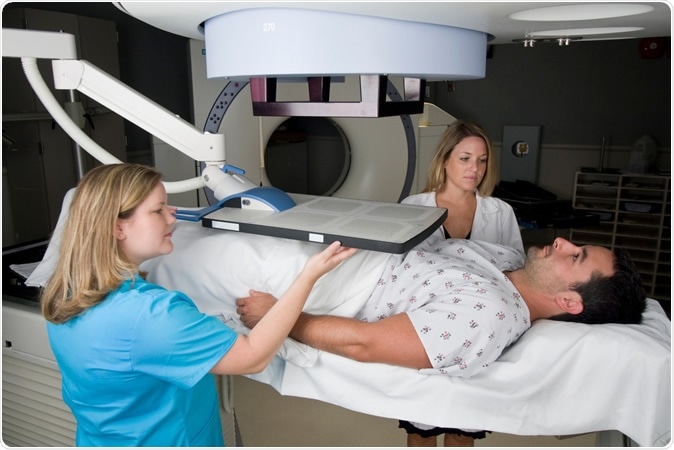Prostate cancer has become the most commonly diagnosed cancer in England, according to the newest data from Public Health England.
In the health agency’s report, there were 49,029 diagnoses made in 2018, which is about 8,000 more than the previous year, surpassing breast cancer with 47,476 cases. Lung cancer followed with 38,996 cases. The new data reveals that there were more cancers detected in 2018 in men than in women, with a total of 15,228 cases and 151,452, respectively.
Overall, there were 868 new diagnoses of invasive cancer every day in 2018, with a total of 316,680 new diagnoses.
Doctors believe that the increase in diagnoses was due to the Fry and Turnbull effect, which influenced patients to seek medical attention. The effect occurred after former BBC Breakfast presenter Bill Turnbull and broadcaster Stephen Fry raised awareness about prostate cancer and urged men to have their check-up.

Man receiving radiation therapy treatments for prostate cancer. Image Credit: Mark_Kostich / Shutterstock
The number of deaths increasing
The number of men dying from prostate cancer in the U.K. has hit an all-time high, with data revealing that there were 12,031 deaths in 2017, up from 11,637 the previous year.
Health experts believe that the increase in deaths related to prostate cancer is not due to the disease becoming more deadly, but may be due to an aging population, with more men diagnosed with the illness.
What are the symptoms?
Prostate cancer is the type of cancer that affects the prostate gland, which is located just below the bladder. The gland helps in the production of healthy sperm cells and having problems with it can affect urination and sexual function.
Prostate cancer develops when a mutation can lead to cells growing uncontrollably, forming a tumor. When the tumor cells spread to surrounding areas and other parts of the body, they can cause potentially fatal complications.
However, prostate cancer has a good prognosis as long as it gets diagnosed early. In the early stages of cancer, there are no symptoms but as the disease progresses, it can cause frequent urination, the urge to urinate more frequently at night, blood in the seminal fluid or urine, erectile dysfunction, weak or interrupted urine flow, and pain or burning sensation when urinating.
How is prostate cancer diagnosed?
Some men may be at a higher risk of developing prostate cancer than the others, especially those who are more than 50 years old, have a family member or close relative who had prostate cancer, and of black ethnic origin.
There isn’t a single test for prostate cancer, but men can undergo prostate-specific antigen (PSA) test to help detect early prostate cancer. Normally, men do not have an elevated PSA level. In some cases, doctors may request other tests such as a cystoscopy or prostate biopsy.
A biopsy can determine if the tumor is cancerous or not, and how far has the tumor spread. Most of the time, doctors may recommend other imaging techniques to determine the extent and severity of the illness, including bone scan, ultrasound, MRI scan, CT scan, and PET scan.
Prostate cancer is one of the cancers that has a good prognosis, with a 5-year survival rate for most men to be nearly 100 percent. For those whose cancer has spread to other parts of the body, the 5-year survival rate is 30 percent.
Common treatments for the illness include radiation therapy and chemotherapy. In some cases, doctors need to surgically remove the prostate gland.